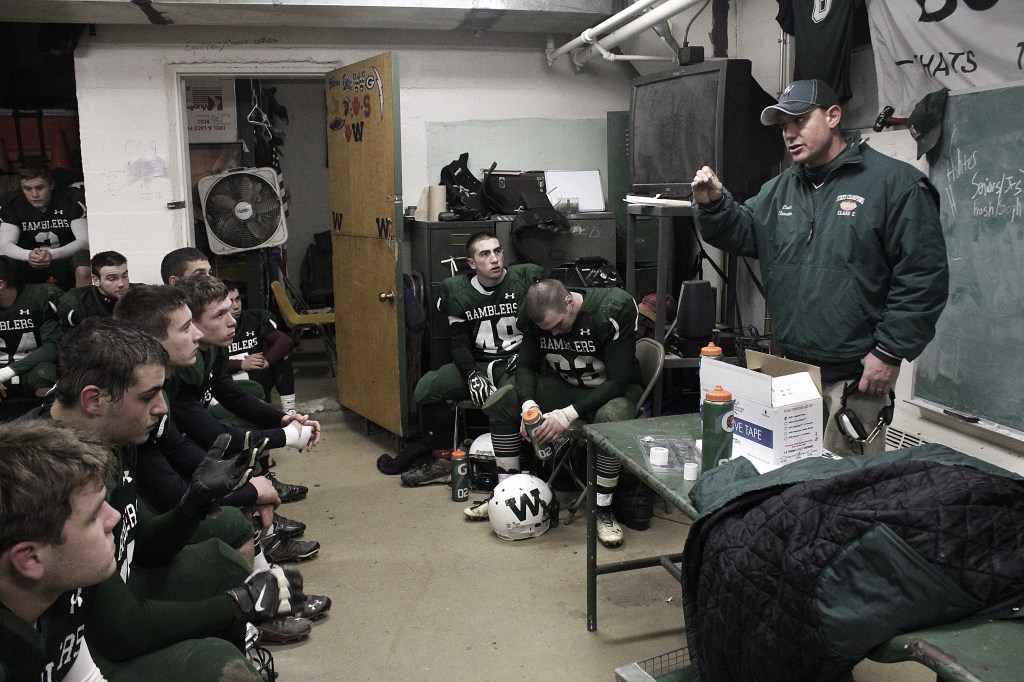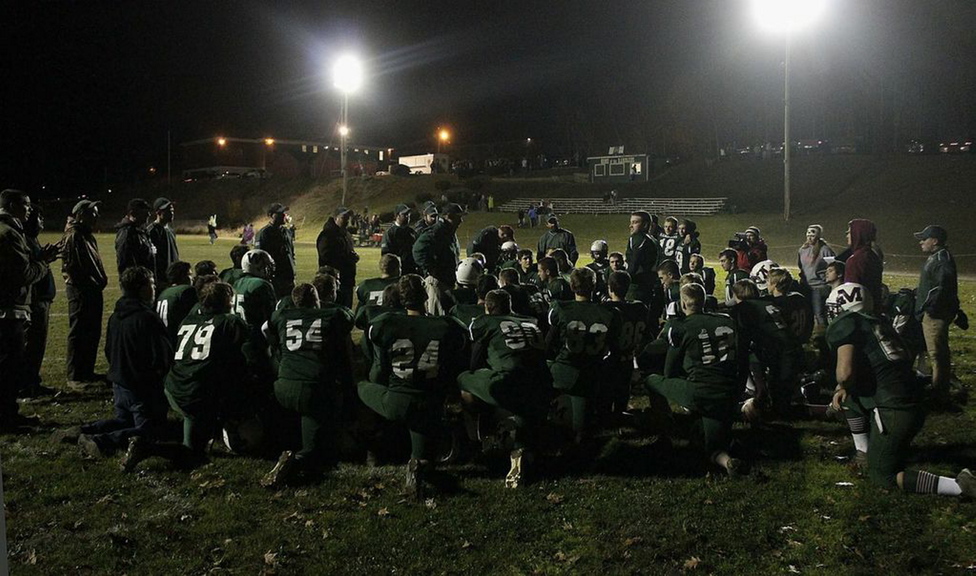Special to the Kennebec Journal
The season started with fireworks, but not the right kind.
On Sept. 6, in a dusty utility closet next to the Winthrop-Monmouth football team’s cinderblock locker room, an electrician, wrench in hand, hunched over a balky electrical transformer. Winthrop High Principal Keith Morin silently looked on.
Sparks flew. Frustration filled the air.
Outside, dusk approached and the 7 p.m. kickoff neared. A crowd gathered for the new Winthrop-Monmouth Ramblers’ first home game, but something seemed wrong. Why were the teams still gathered in the end zone? What was taking so long?
“No game tonight,” someone yelled out near the Lions’ concession trailer, atop the hill that looks over Winthrop’s downtown field. “Transformer blew. Lights won’t come on. Game’s tomorrow at 1.”
“It was disappointing,” senior fullback and nose tackle Dom Cognata said after a practice five weeks later. “I mean, Friday night lights. We’re on a knee, waiting for Mr. (announcer Mark) Arsenault to call our names and start the game. Then Coach (Joel) Stoneton comes over and says, âWe’re not playing tonight.’ We’re like, âWhat is this, a bad omen?'”
Far from it.
Now, more than a week has passed since Winthrop-Monmouth’s season of team-building ended with a 22-20 loss to Dirigo in the second round of Maine’s new Class D football playoffs. The Ramblers — with a roster of 62, deep even by large-school standards — were picked by some to go all the way.
The 2013 team will not be etched into the annals of Maine high school sports. It will, however, go down in the history of the players’ hometowns.
Because of the bake sales, bottle drives and tag sales that went on in Monmouth for nearly a decade, and because of Winthrop’s openness to an eager, unproven partner, one football program was resurrected this fall. Another was preserved.
Players who started as suspicious strangers in the August heat became trusted teammates by Labor Day. Two towns — which some say should do more together — grew closer.
And it’s just begun.
The Monmouth Goffs
Ted Goff was hired as a physical education teacher at Monmouth Academy in 1967. His family bought 28 acres in town in 1971 and Ted started a 34-year run as a teacher, referee and baseball, basketball and football coach.
The first big change came in the early 1970s, when Sabattus High School closed and students from Sabattus and Wales were sent to Monmouth Academy and numbers swelled. Things reversed when Oak Hill High School opened in 1976; the impact on enrollment and sports at Monmouth was huge.
“We went from having a great baseball team to having three kids return the next year,” said Goff, who was head coach. “We put a team on the field, but only three kids were back from the year before.”
Mustang football fared no better. By the time 1978 rolled around, said Goff, an assistant coach for those teams, 17 students came out.
“That was 17 bodies,” Goff recalled, “not 17 players. We stopped the program. We just didn’t have enough kids.”
Momentum started to build in 2003, when Monmouth residents Rod Hiltz, Norm Thombs and Glenn Freeman decided to try to field a football team again.
Supporters held a number of fundraisers, but the program couldn’t quite clear the varsity hurdle, despite more than 30 kids on the roster and impressive scrimmage “wins” against varsity, JV and other club teams.
“We begged for it,” said Eric Goff, Ted’s son and the father of an up-and-coming athlete, Brandon. “We begged everyone who would listen. I never thought it would happen.”
In 2011, Winthrop expressed interest in a joint team. After eight years of practice, patience and preparation, Monmouth was ready.
For the Goffs, it came in the nick of time.
After hearing his grandfather talk about high school football “lots and lots of times” around the dining room table, Brandon Goff knew he’d get the chance to play last spring, when Winthrop coach Joel Stoneton came to Monmouth and welcomed the new players to his program.
“We were all pumped up,” Brandon recalled. “I was so excited to be playing under the lights.”
Brandon, a senior, starred at wide receiver and safety during his first and last season of Rambler football. “My only regret: I wish we started sooner,” he said.
Getting together
Norm Thombs is the soft-spoken keystone behind what transpired between the communities: He lives in Monmouth, has three children in public school and was tapped to coach the Mustangs’ club team at its inception.
Thombs also coached the Winthrop High School team from 1998 to 2003 and was an assistant coach before that. From 1998 to 2001, with Thombs in charge and the late Lee St. Hilaire at quarterback, the Ramblers went 35-6, winning a Class C state championship.
If you lived in Winthrop then, your Friday nights were booked each fall. “The crowds were amazing,” regularly hitting 5,000 or more, Thombs said. “Crazy, crazy, crazy.”
The Ramblers’ high point after Thombs stepped down came in 2008, when Winthrop played for the Class C state title and lost to John Bapst in a close game marked by a disputed fumble-recovery call.
Recently, Winthrop’s records and roster sizes started slipping. A 2012 game story in the Kennebec Journal unfathomably began: “The Winthrop football team found itself overpowered once again⦔ The Ramblers had 30 eligible athletes most weeks. If a player got hurt during a game, his replacement could look overwhelmed.
Things were about to change.
After two years of talks between Thombs and Coach Stoneton — who played on Thombs’ Winthrop teams — the Mustangs’ program, Rambler Sports Boosters and Maine Principals’ Association blessed a joint team. The MPA action came in the same year it added a new Class D division for football and established a 454-student enrollment ceiling for teams to qualify. Together, Monmouth and Winthrop stand at 451.
Some people immediately questioned how the experiment could succeed, said Rod Hiltz, a Mt. Blue football star in the mid-1970s who moved to Monmouth in 1999 and helped start the Mustangs’ program.
“It was, âWinthrop? That’s who we play in basketball all the time. Mortal enemies,'” Hiltz said. “Then I thought: Wait a minute. Most of their players are, like, cousins to our kids.”
Mandatory practices started in August. Cognata, the Winthrop senior who on Sept. 7 scored the first touchdown in Winthrop-Monmouth history, didn’t know what to expect.
When you play with guys from your town, he said, “You see them every day. You see them at school. These (Monmouth) guys, we didn’t know them. We hadn’t seen them.” But, “we just started to mesh.”
Well, on most days.
Two-a-day workouts meant reporting to Winthrop’s practice field early, Cognata said, a smile creeping onto his face. One morning in particular, the team took notice of Nate Gagne, a tackle from Monmouth.
“When we started morning practices, Nate had to work first,” Cognata said. “He comes in and all you can smell — I’ll say it — is cow dung. He’s a farmer. He was working on the farm. We’re like, âWhat the hell?'”
Storybook season
The new Ramblers were tested immediately. Lisbon, Dirigo, Old Orchard Beach and Oak Hill — stalwarts in the Campbell Conference and all of which made the playoffs at season’s end — comprised Winthrop-Monmouth’s first four games.
Team depth was apparent from the start. When featured running back Zach Glazier was hobbled by an ankle injury, senior Jake Weeks of Monmouth stepped in. Monmouth’s Brandon Goff was Winthrop quarterback Jared Hanson’s favorite receiving target. It was Goff who made a key defensive play to ice an 18-13 win at Oak Hill that had playoff implications.
“Not bad, for a bunch of kids who nobody thought would be able to play together,” Stoneton said to his team after its win over Oak Hill.
The Ramblers won those September games and kept going, running to a 9-0 record that included a 40-0 home playoff win against Telstar. Winthrop-Monmouth was ranked No. 1 in Western Maine Class D and would have a second home playoff game against Dirigo, a team known for its physical play that was out to avenge a regular-season loss.
The night of Friday, Nov. 8, was windy and raw. Helium-filled balloons of maroon, green and white, combining the Monmouth and Winthrop school colors, adorned the home sideline.
As expected, Dirigo ran the ball hard. A new offense, “the Wildcat,” had been added, allowing three running backs or the quarterback to take direct snaps and go. The game plan was simple: Run the ball early and often. Overpower the Ramblers. Keep the ball away from Hanson, Glazier, Weeks and Goff.
Despite Dirigo running nearly twice as many plays, Winthrop-Monmouth’s talent and passing attack gave the Ramblers a 20-16 lead and the ball, with less than four minutes left. The crowd sensed a victory.
It didn’t happen.
A fumbled snap — almost recovered by Dirigo — cost the Ramblers crucial yards in their own territory. A fake punt on a fourth-and-9-to-go play fell just short of a first down. Three plays later, Dirigo ran for the winning score on a broken play. The game ended 22-20.
The Ramblers’ teamwork held. After both teams shook hands at midfield, the players ran — as they did after every game — to one end zone, removed their helmets, took a knee and waited.
“We started this as a team and we’re going to end it as a team,” Coach Stoneton said. His assistants, one by one, praised the players for their dedication, a Campbell Conference title and memories.
Thombs, of Monmouth, an assistant who wore a headset and spotted plays during home games, told the players: “It hurts so much because it means so much.”
He later explained: “One of the seniors, who I’d coached (in Monmouth) since he was in fourth grade, told me: âThis was my only shot. This was my only year.’ That’s when it hit me.”
Glazier, the senior halfback, stood and in a clear voice said: “I want to thank everybody. You guys gave me something special.”
Winthrop athletic director Chris Moreau, who worked at Dirigo in 2012, said: “I can’t think of 61 or 62 guys I’d rather be on this field with. You made two communities proud.”
The stands now empty, 18 seniors from two high schools slow-jogged a final lap around the field. All of the players, one and two at a time, walked up the hill toward waiting families and girlfriends.
The only sounds were cleats on wooden steps, then on the parking lot that leads to the locker room.
Snow flurries fell lightly through the stadium lights.
Eric Conrad, of Winthrop, is a former editor of the Kennebec Journal and Morning Sentinel and former sports editor of the Portland Press Herald/Maine Sunday Telegram. He works as director of communication & educational services at the Maine Municipal Association.
Send questions/comments to the editors.




Comments are no longer available on this story